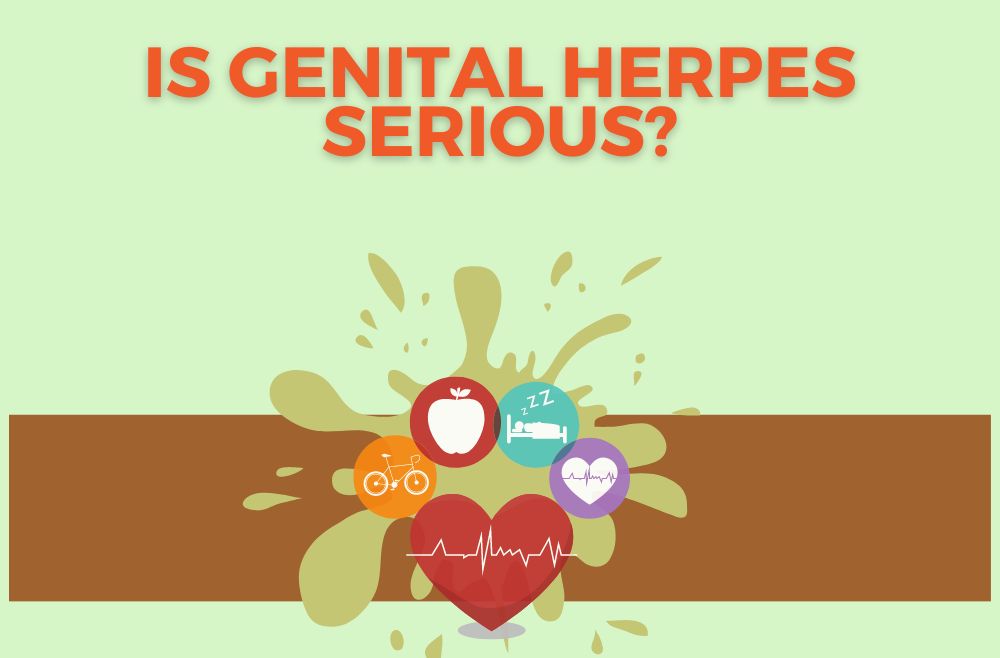Genital herpes is a common yet serious condition that can bring physical and emotional distress. While some might consider it an uncomfortable topic to discuss, understanding its causes, effects, and treatments can be invaluable in managing the infection.
By juxtaposing this knowledge against the reality of living with genital herpes, you can gain insight into how serious this condition truly is.
Join us as we explore the realities of genital herpes and equip you with the information needed to make informed decisions about your health.
Key Takeaways
- Genital herpes is a common sexually transmitted infection caused by the herpes simplex virus.
- It can cause sores on the genital or rectal area, thighs, or buttocks.
- The emotional impact of having an incurable virus that’s primarily passed on through intimate contact can be hard to manage.
- Serious complications can arise if genital herpes is not managed properly.
What Is Genital Herpes
Genital herpes is a sexually transmitted infection caused by the herpes simplex virus. It’s most often spread through sexual contact with someone who has the virus. It can cause sores on your genital or rectal area, thighs, or buttocks.
Genital herpes can be uncomfortable and emotionally difficult to cope with, especially in terms of sex and relationships. The emotional impact of having an incurable virus that’s primarily passed on through intimate contact can be hard to manage.
There are treatments available that can reduce symptoms of genital herpes like pain, itching, and even outbreaks themselves. But it’s important to remember that there is no cure for this virus; once you have it, you will always have it.
How Is Genital Herpes Transmitted
You can contract genital herpes through sexual contact with someone who already has it. It is estimated that one in six people aged 14 to 49 have the virus, making it a common STI among high-risk groups.
Genital herpes can be spread through any type of sexual contact, including vaginal, anal or oral sex. It can also be passed from one person to another even when there are no visible symptoms present.
To prevent transmission, it’s important to practice safe sex by using condoms and limiting the number of partners you have. It’s also important to get tested if you think you may be at risk for genital herpes and talk openly with your partner about STI status before engaging in any kind of sexual activity.
Taking these preventive measures helps reduce the risk of spreading or contracting genital herpes.
Symptoms of Genital Herpes
Symptoms of genital herpes can range from mild to severe and may include itching, burning, pain, blisters or sores. Living with herpes can be challenging due to managing outbreaks. Symptoms may become more apparent during an outbreak, which could include:
- Swelling of the lymph nodes in the groin area
- Fever
- Headache
- Painful urination
It is important for those living with genital herpes to be aware of all possible symptoms and seek medical advice if they occur. Some people may not experience any symptoms at all, while others might find that their symptoms vary throughout time. The best way to manage outbreaks is by taking antiviral medications prescribed by a doctor and avoiding contact with other people during an outbreak.
Treatments for Genital Herpes
Treating genital herpes typically involves antiviral medications to reduce the severity and frequency of outbreaks. These medications can help prevent transmission when taken daily, and may also reduce the duration of outbreaks if taken at the first sign.
Identifying outbreak triggers can be helpful in avoiding future occurrences. Your doctor can also provide advice on lifestyle changes that may help manage symptoms, such as avoiding stress, getting adequate sleep, eating a balanced diet, and limiting alcohol consumption.
In some cases, topical creams or ointments may be recommended for relief from itching or pain associated with an outbreak.
For severe cases of genital herpes, your doctor may recommend oral steroids or other treatments.
Better yet, since we advocate all natural remedies, see our top recommendations here.
Complications of Genital Herpes
Having genital herpes can lead to serious complications if not managed properly. These may include severe pain in the affected area, which can be difficult to manage, and a weakened immune system, leading to frequent infections and a higher risk of other illnesses.
Lowered sexual health is another potential complication due to discomfort during intercourse and an increased risk of transmitting the virus to your partner. Additionally, psychological distress can be caused by the stigma or fear of transmitting the virus.
Genital herpes is a manageable condition that can be kept under control with medication and lifestyle changes. It’s important to seek medical advice in order to develop an effective treatment plan.
This includes managing symptoms like pain, as well as improving overall physical and emotional health.
Tip: Taking proactive steps will help ensure your genital herpes remains contained and doesn’t become a serious complication.
What’s Next?
You’ve learned a lot about genital herpes today – it’s serious and can be uncomfortable. But with proper treatment, you can manage the symptoms and reduce the risk of complications.
Remember, this virus isn’t something to fear or be ashamed of: it’s an opportunity for growth and strength, like a tree that blooms in spite of adversity.
With care and understanding, you can take control of your health and live life to its fullest.

